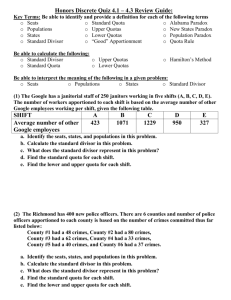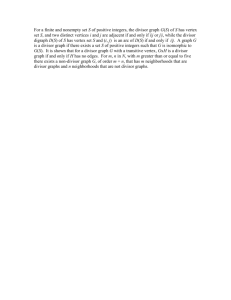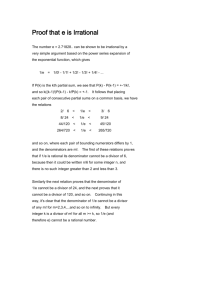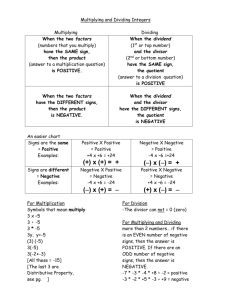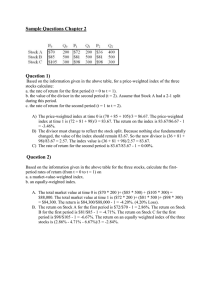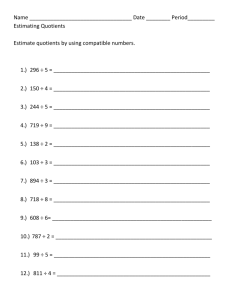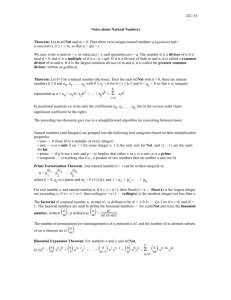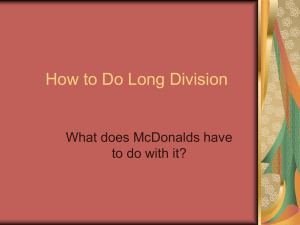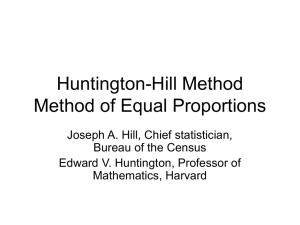Document 10413289
advertisement
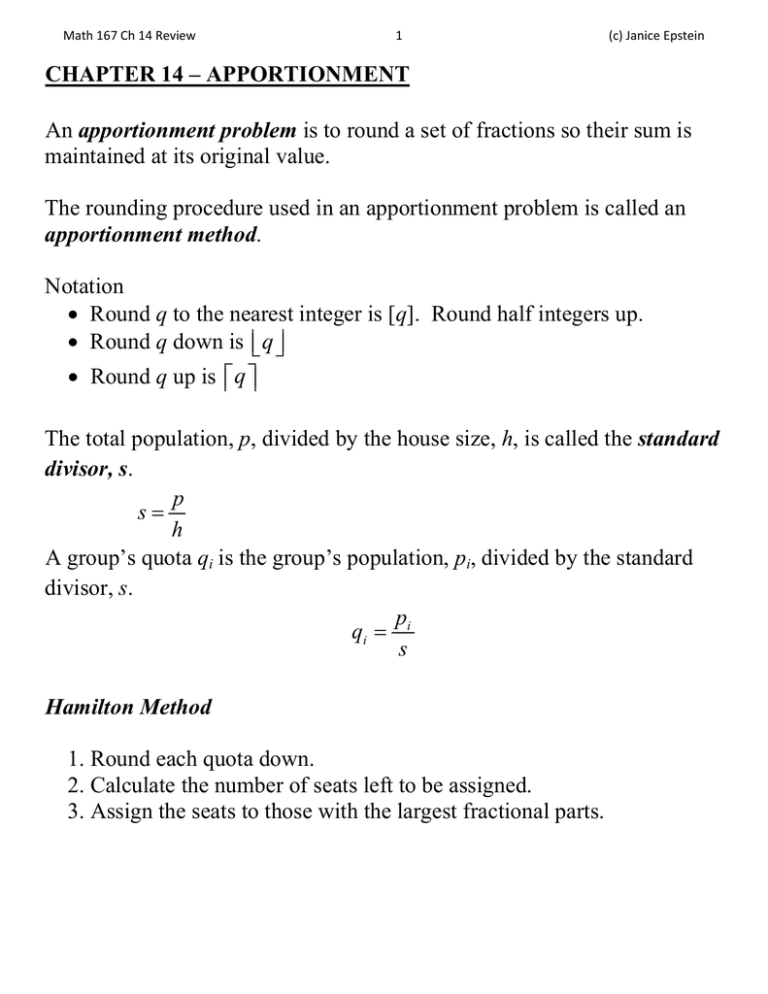
Math 167 Ch 14 Review 1 (c) Janice Epstein CHAPTER 14 – APPORTIONMENT An apportionment problem is to round a set of fractions so their sum is maintained at its original value. The rounding procedure used in an apportionment problem is called an apportionment method. Notation Round q to the nearest integer is [q]. Round half integers up. Round q down is q Round q up is q The total population, p, divided by the house size, h, is called the standard divisor, s. p s h A group’s quota qi is the group’s population, pi, divided by the standard divisor, s. p qi i s Hamilton Method 1. Round each quota down. 2. Calculate the number of seats left to be assigned. 3. Assign the seats to those with the largest fractional parts. Math 167 Ch 14 Review 2 (c) Janice Epstein Use the Hamilton method to apportion 36 silver coins to Doris, Mildred, and Henrietta if Doris paid $5900, Mildred paid $7600, and Henrietta paid $1400. Doris 5900 Mildred 7600 Henrietta 1400 When the bag of coins is opened, there are 37 coins. How should they be apportioned? Doris 5900 Mildred 7600 Henrietta 1400 Math 167 Ch 14 Review 3 (c) Janice Epstein A paradox is a statement that is seemingly contradictory or opposed to common sense and yet is perhaps true. The Alabama paradox occurs when a state loses a seat as the result of an increase in the house size. The new states paradox occurs in a reapportionment in which an increase in the total number of seats causes a shift in the apportionment of existing states. The population paradox occurs when there are a fixed number of seats and a reapportionment causes a state to lose a seat to another state even though the percent increase in the population of the state that loses the seat is larger than the percent increase of the state that wins the seat. Consider two numbers, A and B, where A > B. The absolute difference between the two numbers is A B The relative difference between the two numbers is A B 100% B Find the absolute and relative difference between the following numbers (a) 1 and 2 (b) 10 and 11 (c) 2000 and 2001 Math 167 Ch 14 Review 4 (c) Janice Epstein A county has 4 districts, North, South, East, and West. They will apportion for a 100 member advisory council using the method of Hamilton. Determine the number of council members from each district. North 27,460 South 17,250 East 19,210 West 1000 Ten years later the county will reapportion for the 100 seats using new population data. Determine the number of council members from each district. Did a paradox occur? North 28,140 South 17,450 East 19,330 West 990 Math 167 Ch 14 Review 5 (c) Janice Epstein A country has two states, Solid and Liquid. Use Hamilton’s method to apportion 12 seats for their congress. Solid 144,899 Liquid 59,096 Another state, Plasma, wants to join. If there are 38,240 people in that state, how many representatives should they receive? Apportion using Hamilton’s method. Solid 144,899 Liquid 59,096 Gas 38,240 Did any paradoxes occur? Math 167 Ch 14 Review 6 (c) Janice Epstein Divisor Methods The standard divisor, s, represents the average district population. Apportionment can be done by adjusting the average district population to be a specific value called the adjusted divisor, d. A divisor method of apportionment determines each state’s apportionment by dividing its population by a common divisor d and rounding the resulting quota. Different divisor methods use different rounding rules. A critical divisor is a divisor that will produce a quota for each population that gives a correct total number of seats. The Jefferson Method p 1. Find the standard divisor, s. Then find qi i s 2. If the total number of seats is not correct, find the new divisors that p correspond to giving each state one more seat. di i qi 1 3. Assign a seat to the state with the largest di. If the total number of seats is correct, stop. Otherwise repeat step 2. 4. The adjusted divisor d will be the exact value of the last divisor found in step 3. Math 167 Ch 14 Review 7 (c) Janice Epstein Use the Jefferson method to apportion 36 silver coins to Doris, Mildred, and Henrietta if Doris paid $5900, Mildred paid $7600, and Henrietta paid $1400. Comment on your results. Doris 5900 Mildred 7600 Henrietta 1400 When the bag of coins is opened, there are 37 coins. How should they be apportioned? Comment on your results Doris 5900 Mildred 7600 Henrietta 1400 Math 167 Ch 14 Review 8 (c) Janice Epstein A school offers four different art classes with the enrollments shown below. Ten new teachers will be hired using Jefferson’s method. Determine who gets the new teachers and comment on the results. Ceramics 785 Painting 152 Dance 160 Theatre 95 Quota Rule says that the number assigned to each represented unit must be the standard quota, qi, rounded up or rounded down. Balinski and Young found that no apportionment method that satisfies the quota rule is free of paradoxes. Math 167 Ch 14 Review 9 (c) Janice Epstein The Adams Method p 1. Find the standard divisor, s. Then find Ni qi i s 2. If the total number of seats is not correct, find the new divisors that p correspond to giving each state one fewer seat. di i qi 1 3. Remove a seat from the state with the smallest di. If the total number of seats is correct, stop. Otherwise repeat step 2. 4. The adjusted divisor d will be the exact value of the last divisor found in step 3. The Webster Method p 1. Find the standard divisor, s. Then find Ni qi i s 2. If the total number of seats is correct, the process is done. 3. If the total number of seats is too few, use a critical divisor of d+ and the state with the largest critical divisor gets a next seat pi di N i 12 4. If the total number of seats is too many, use a critical divisor of d- and the state with the smallest critical divisor loses a seat pi di N i 12 Math 167 Ch 14 Review 10 (c) Janice Epstein Apportion the regions below using both the Adams method and the Webster method for a house size of 16. Comment on your results. Beach 28,204 Forest 11,267 Plains 4203 Swamp 1462 Beach 28,204 Forest 11,267 Plains 4203 Swamp 1462 Math 167 Ch 14 Review 11 (c) Janice Epstein Geometric Mean The arithmetic mean of two numbers a and b is given by ab x 2 The geometric mean of two numbers a and b is given by G a, b ab Example Find the arithmetic and geometric means for the following numbers. (a) 0 and 1. (b) 4 and 5 (c) 25 and 26 (d) Round 0.2 and 3.47 using their geometric means. __0________1________2________3________4________5________6__ Math 167 Ch 14 Review 12 (c) Janice Epstein The Hill-Huntington Method pi s 2. Round each quota qi up or down by comparing it to qi* qi qi 3. If the total number of seats is correct, the process is done. 4. If the total number of seats is too few, implement Jefferson’s method pi with a critical divisor of di N N 1 1. Find the standard divisor, s. Then find qi 5. If the total number of seats is too many, implement Adams’ method pi with a critical divisor of di N N 1 Apportion the regions below using the Hill-Huntington method for a house size of 16. Beach 28,204 9.998 Forest 11,267 3.99 Plains 4203 1.49 Swamp 1462 0.52 Math 167 Ch 14 Review 13 (c) Janice Epstein A country has 5 states and a house size of 40. Apportion for their congress using the following methods: Hamilton, Jefferson, Adams, Webster and Hill-Huntington. Northwest 130,451 10.3219 Southwest 157,633 12.4767 Central 25,879 2.0477 Southeast 88,956 7.0386 Northeast 102,611 8.1191 Northwest 130,451 10.3219 Southwest 157,633 12.4767 Central 25,879 2.0477 Southeast 88,956 7.0386 Northeast 102,611 8.1191 Math 167 Ch 14 Review 14 (c) Janice Epstein Northwest 130,451 10.3219 Southwest 157,633 12.4767 Central 25,879 2.0477 Southeast 88,956 7.0386 Northeast 102,611 8.1191 Northwest 130,451 10.3219 Southwest 157,633 12.4767 Central 25,879 2.0477 Southeast 88,956 7.0386 Northeast 102,611 8.1191 Northwest 130,451 10.3219 Southwest 157,633 12.4767 Central 25,879 2.0477 Southeast 88,956 7.0386 Northeast 102,611 8.1191 Math 167 Ch 14 Review 15 (c) Janice Epstein SAMPLE EXAM QUESTIONS FROM CHAPTER 14 1. Match the definition to the term (A) Quota Rule is _______ (B) Alabama Paradox is ______ (C) Population Paradox is ______ I. An increase in the total number of seats causes a shift in the apportionment of existing states. II. A state loses a seat as the result of an increase in the house size. III. The number assigned to each represented unit must be the standard quota, qi, rounded up or rounded down. IV. A reapportionment causes a state to lose a seat to another state even though the percent increase in the population of the state that loses the seat is larger than the percent increase of the state that wins the seat. 2. Round the following numbers using the geometric mean. 0.39 rounds to ________ 3.47 rounds to _______ 3. Use the Webster method of apportionment to distribute 12 seats on a city council to three districts with the populations shown below. District North Central South Population 30,000 10,100 34,900 Math 167 Ch 14 Review 16 (c) Janice Epstein 4. A school is offering Gothic literature, Hispanic literature and Women writers. There are enough teachers to teach 10 sections of literature. We know that 58 people signed up for G, 20 for H and 42 for W. (a) Use Hamilton’s method to determine the number of sections of each class that will be taught. (b) Use Jefferson’s method to determine the number of sections of each class that will be taught.
